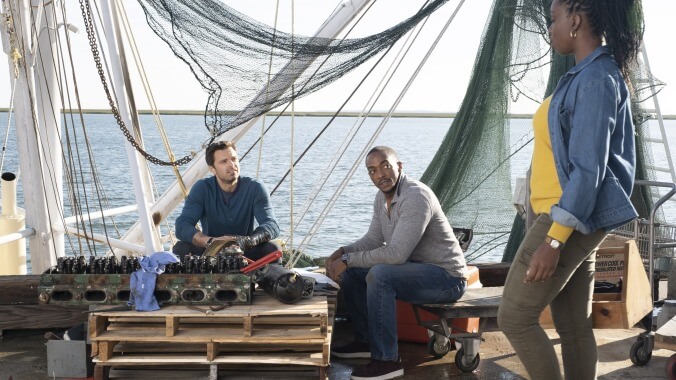The Falcon and the Winter Soldier finally gives Sam the lead role he deserves


I grade Marvel shows based on how much I enjoy them. I admit I’m an impatient watcher—I’ve never been someone who enjoys watching very slow pacing, especially if the “atmospheric” elements are just a bunch of dark alleyways and people meeting and talking in code. I’m especially suspicious of any show that has a dearth of humor. Real people make more jokes than that in real life. At least, in my experience they do. But Marvel really exceeded my expectations for this show. Yes, there are pitfalls and uneasy dynamics. Sometimes action sequences happen because it’s fun to watch everyone watch fight each other. Episode three, “Power Broker,” seemed so out of line with the rest of the show I’m curious if some of you commenters were right, and the pandemic seriously screwed up the filming and editing of that one.
But as I wrote in my first episode recap, these MCU shows take their character beats and plot arcs from comics. They plan on you sticking around to see what happens, and they reward you for that. For example, Sam had to earn the lead of this show. Not because he’s a Black character or because he was a side character, but because he didn’t have as much of a background or history before this show—perhaps because he was more of a side character, not to mention that film and TV historically haven’t done right by Black characters.
But Sam’s storyline and character arc certainly didn’t have the kind of easy gaps where one could wonder what he was doing in his downtime. Unlike Steve’s re-entry into the modern world, and Bucky’s time being deprogrammed in Wakanda, Sam’s story has lain fallow in the MCU. He seemed somewhat un-mysterious: He’s not a man out of time, he doesn’t have superpowers, he doesn’t feel like an abandoned rich boy like Tony did. He was born human and he’s determined to stay so. The part of him that is intriguing is what this show explored—his goodness, his trustworthiness, his anchor-like quality to the people around him. How he actually feels about the people around him, despite his fierce loyalty. And of course, what is must be like to be a Black man surrounded by white men who are given so much license to do whatever the hell they want—more so than usual, because they had those superpowers, those gadgets, the money he doesn’t have.
“Truth” starts with a fight that echoes the one at the end of Captain America: Civil War, inviting John Walker to decry his hiring and firing tribunal, and brings Julia Louis-Dreyfus in as a Contessa Valentina Allegra de Fontaine (“Val”). And I recalled another aspect of this show that I had previously forgotten to take into account. I should’ve realized that this show was invested in leaving us with more questions than answers. It is an MCU show, after all— and both characters are carrying a shield a torch a legacy that was upheld by one of the tentpole characters of the MCU. But that also means that tentpole has to be replaced quickly and efficiently.
I think that’s also why there a real danger of Bucky’s characterization taking over Sam’s. Not because he’s a more interesting person, but it’s really hard not to be curious about a man with a metal arm who needs to deprogram himself of decades of being a killing assassin. Compared to that, Sam’s story feels…smaller. But just because it’s smaller or more relatable doesn’t mean it can’t be heroic.
In fact, it’s those aspects that makes their frank discussion as Sam practices with the shield feel so earned. My jaw dropped when Bucky said about Steve, “I don’t think either of us understood what it meant for a Black man to handle the shield. I owe you an apology.” After so much haranguing, Bucky finally understands where Sam is coming from.
Sam speaks so much wisdom to Bucky when he tells him, “But Steve is gone. And I know this is a surprise but, it doesn’t matter what Steve thought.” He continues, “You gotta stop looking to other people to tell you who you are. You wanna climb out of the hole you’re in, do the work.” And “You weren’t amending, you were avenging” Sam tells Bucky he told people he was sorry to make himself feel better. “You gotta make them feel better.” Did everyone write that down? Good. So nice for Marvel to slip in a therapy session for all of us. Stay accountable, folks!
Sam could’ve shared any of those things with Bucky much sooner—it was clear from the time Sam was texting Bucky without an answer in the beginning of the series that Sam was invested in their friendship, and willing to wait out Bucky’s stubbornness. It’s hard not to have low expectations for a franchise that dragged its feet for years before Black Panther and eked out Captain Marvel under deep duress and loves to have non-superpowered women of color murdered or brutally assaulted over and over or deify a character that committed multiple war crimes and and so on. The morality of the MCU is suspect even while it wants to highlight goodness as obvious.
That’s why giving Isaiah Bradley such a strong speech really spoke to me. Sure, Sarah tells Sam not to let Isaiah get in his head. But I think Isaiah’s supposed to get in all our heads. He has a very clear reason and the experience to say, “They will never let a Black man be Captain America. And even if they did, no self-respecting Black man would ever want to be.” Sam listens and hears him (he even switches to calling him “Mr. Bradley” in that moment), but you understand why Sam just can’t agree with Isaiah. He can see Isaiah’s pain, and give it space, and decide that the past does not predict the future.
In contrast, I think the show really failed to show us how Karli must feel being such a beacon of hope for people. How she has been radicalized, and how she can radicalize others. Especially considering how she only has to text people in a random New York City park to get them invested. Are you kidding? It’s almost like they’re purposefully mum about her ability to influence others so they don’t accidentally give someone a playbook for how to do it.
Incidentally, I was perturbed to see how the GRC were discussing the Patch Act. The MCU really overestimates how these global entities actually work, how they pass acts, and how much power they actually have in international affairs. So many action movies do this, and you know what, as someone who studied public diplomacy and was constantly yelling at the screen during Avengers: Age Of Ultron… it is very depressing! Team America: World Police felt more accurate in that regard.
Finally, does John Walker have parents? I wonder if him being an orphan made him an even better candidate for Captain America initially, like how NASA has to take into account astronaut’s families when they prepare them for outer space. It seems like he felt like Lemar was his true family—makes his lying to Lemar’s parents about killing the “person responsible” worse. Also, are Lemar’s parents really okay with John having apparently killed Lemar’s murderer? Then again, they are grieving.
Stray observations
- “We’re just two guys who had a mutual friend.” AW THE BANTER IS BACK, Y’ALL
- The Countess handing them a blank card was hilarious. What a funny balance between dark humor and just plain darkness. I wonder how Wyatt Russell will balance that in the next episode (and whatever future shows/movies he’ll surely be in).
- I can’t believe Bucky asked for a favor after being told to stay out of Wakanda. The NERVE of this guy.
- I know we’re not supposed to worry about this while watching this show. BUT HOW DOES EVERYONE GET EVERYWHERE THEY GO? Did Sam take the shield in that very obvious carry-on?
- Loved the moment where Bucky woke up on the couch and smiled as Sam’s nephews played with the shield. He’ll make a great stepdad, Sarah!
- “Why didn’t you use the metal arm?” “I don’t always think of it immediately. I’m right-handed.”